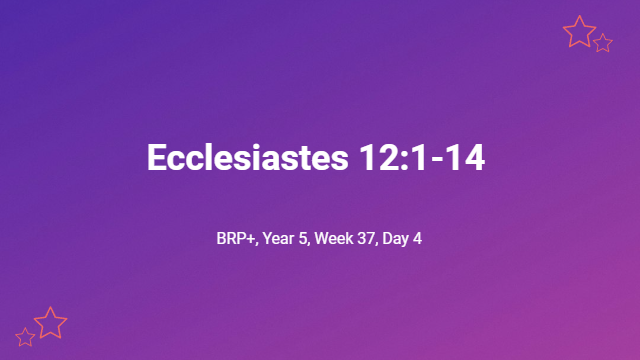Ecclesiastes 12:1-14
Q.1. What case did Solomon make for seeking God while we are still young? What did he convey about old age? Where will life end? – (Ecc.12:1-8)
Solomon had already pointed out that -… childhood and the prime of life are fleeting (Ecc.11:10). He added that all too soon – … evil days come and the years draw near when you will say, “I have no delight in them” (Ecc.12:1). He painted a gloomy picture of old age. He implied that eyesight is darkened, mighty men stoop, sleepless nights increase, and men fear the future (Ecc.12:2-5). In the end – … For man goes to his eternal home while mourners go about in the street (Ecc.12:5). His advice was that we also – Remember your Creator in the days of your youth (Ecc.12:1 c.f. 12:6). For – then the dust will return to the earth as it was, and the spirit will return to God who gave it (Ecc.12:7). All this reinforces the truth that childhood and the prime of life are indeed fleeting.
Q.2. How did Solomon spend his time? What did he hope to achieve? How is education limited? What was Solomon’s conclusion? – (Ecc.12:9-14)
The books of 1 Kings, 2 Chronicles, Proverbs, and Song of Solomon, reveal that Solomon was an incredibly productive person. He taught people knowledge, arranged many proverbs, and defined truth (Ecc.12:9-10). These words could feed and protect the readers, just as a shepherd could feed and protect his sheep (Ecc.12:11). However, Solomon warned – … the writing of many books is endless, and excessive devotion to books is wearying to the body (Ecc12:12). Wealth and education are extremely limited in what they can achieve. His conclusion rates as the best advice in the whole book – 13 … fear God and keep His commandments, because this applies to every person. 14 For God will bring every act to judgment, everything which is hidden, whether it is good or evil (Ecc.12:13-14). The preacher concluded that everything else doesn’t make sense and doesn’t add up unless you factor in God. (c.f. Rom.8:20).

